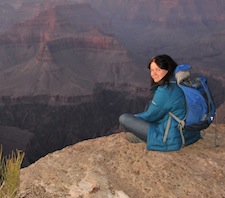
Positions and education
January 2012 - present: Post-doctoral researcher, Read Group, Centre for infectious Disease Dynamics, Penn State University, PA, USA
June 2011-December 2011: Post-doctoral researcher, Institute for Evolutionary Biology, Edinburgh, UK
January 2011 - June 2011: Teaching post on the Zoology & Evolutionary Biology honours programmes, University of Edinburgh, UK
October 2007- June 2011: NERC funded PhD, Institute of Evolutionary Biology, School of Biological Sciences, The University of Edinburgh ‘The Evolutionary Ecology of Transmission Strategies in Protozoan Parasites'. Supervisors Drs Sarah Reece, Nick Colegrave & Nicole Mideo.
June - September 2007: Evolutionary and Ecological Entomology research group, The University of Sheffield, UK. Research assistant "The effect of growth rate on innate immune responses"
September 2003 - June 2007: MBioSci Zoology (1st class), The University of Sheffield. Fourth year masters project ‘Impact of Insect Anti-Microbial Peptides on Bacterial Mutation Rates'. Supervisor Dr Jens Rolff.
My interests are in applying an evolutionary ecology approach to understanding how parasites interact with each other and hosts to shape patterns of infection and disease. Mixed-species and mixed-strain infections are common and it is becoming increasingly apparent that parasite interactions within the host environment can have important implications for the severity and transmission of disease. However, while parasite within-host ecology is increasingly receiving attention, continuing on to examine the links to between-host processes is still often neglected. I am interested in how competition between different strains of vector-borne parasites shape parasite dynamics both within vertebrate hosts and insect vectors, and how these dynamics play out across scales to determine disease transmission and parasite evolution.
While working in the Read group, I have expanded my interest in parasite within-host ecology and life history traits to consider how these traits and interactions will influence the evolution and spread of drug resistance. We are gaining an increased understanding of how antimicrobial treatment regimes can influence the density of resistant parasites within the vertebrate host. For example, there is mounting evidence that aggressive treatment regimes can allow competitive release of resistant strains by clearing susceptible competitors from infections. The next step is to try and understand the mechanisms of within-host competition and how this links to between-host transmission.
Pollitt, L.C., Mackinnon, M.J., Mideo, N. & Read, A.F. (2013) Mosquitoes and attenuated growth phenotypes. Malaria Journal. 12, 440
Carter, L.M., Kafsack, B.F.C., Llinás, M., Mideo N., Pollitt, L.C., & Reece S.E. (2013) Stress and Sex in Malaria Parasites: Why Does Commitment Vary? Evolution, Medicine, and Public Health. 1, 135-147
Pollitt, L.C., Churcher, T.S., Dawes, E.J., Khan, S.M., Sajid, M., Basáñez, M.G., Colegrave, N., & Reece, S.E. (2013) Costs of crowding for the transmission of malaria parasites. Evolutionary Applications. 6, 617-629
Pollitt, L.C., Reece, S.E., Mideo, N., Nussey, D.H. & Colegrave, N. (2012) The Problem of Autocorrelation in Parasitology. PLoS Pathogens. 8, e1002590
Reece, S.E., Pollitt, L.C., Colegrave, N. & Gardner, A. (2011) The meaning of death: evolution and ecology of apoptosis in protozoan parasites. PLoS Pathogens. 7(12): e1002320
Pollitt, L.C., MacGregor, P., Matthews, K. & Reece, S.E. (2011) Malaria and trypanosome transmission: different parasites, same rules? Trends in Parasitology 27, 197-203
Pollitt, L.C., Mideo, N., Drew, D.R., Colegrave, N., Schneider, P. & Reece, S.E. (2011) Competition and the Evolution of Reproductive Restraint in Malaria Parasites. American Naturalist 177, 358-367
Graham, A.L., Shuker, D.M., Pollitt, L.C., Auld, S.K.J.R., Wilson, A.J. & Little, T.J. (2011) Fitness consequences of immune responses: strengthening the empirical framework for ecoimmunology. Functional Ecology 25, 5-17
Pollitt, L.C., Colegrave, N., Khan, S., Sajid, M. & Reece, S.E. (2010) Investigating the evolution of PCD in malaria parasites: the importance of ecology. Invited review for Parasites and Vectors 3:105
Haine, E.R., Pollitt, L.C., Moret, Y., Siva-Jothy, M.T. & Rolff, J. (2008) Temporal patterns in immune responses to a range of microbial insults (Tenebrio molitor). Journal of Insect Physiology 54, 1090-1097.
Manuscripts in review
Pollitt, L.C., Huijben, S., Salathé, R., Sim, D., Jones, M. & Read, A.F. Rapid response to selection, competitive release and increased transmission potential of artesunate-selected Plasmodium chabaudi malaria parasites. PLoS Pathogens.
Other Interests
Science communication, cycling, running, hiking
